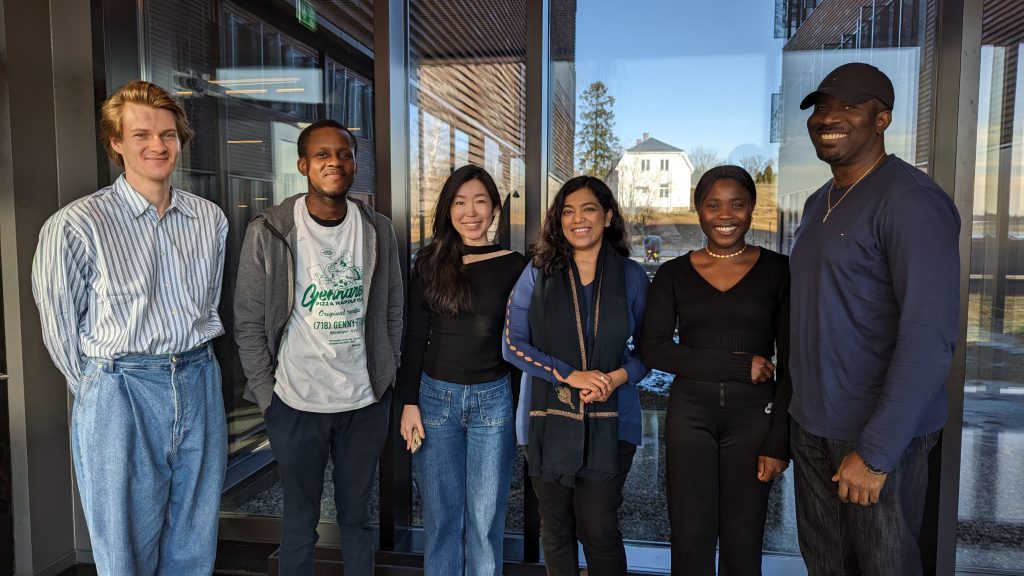
Precious Ayomide Kayode:
My name is Precious Ayomide Kayode. I was born and raised in Nigeria. After obtaining my bachelor’s degree in International Relations in the year 2019, I became more interested in the humanitarian sphere with a specific focus on topics such as: community-oriented policing, human security, gender equality, peace studies, human rights, climate change, and immigration issues.
I am currently pursuing my master’s degree in international relations at the Norwegian University of Life Sciences, and due to my passion for research and civil society engagement, I am glad I chose the ICT4COP internship. Being a participant in the coursework on understanding post-conflict police and security reform enabled me identify the importance of this internship program, and broadened my perspective on the dire need to foster trust, effective communication and cooperation between the police and the citizens of every country for strengthening human security. Therefore, in this internship program, I look forward to working with the amazing team and my supervisor at the ICT4COP center and also learn more about the COP project in post-conflict contexts.
Kingsley Ekechukwu:
My name is Kingsley Ekechukwu, originally from Nigeria but have been living in Norway since 2009. I am currently doing my Masters degree programme in Global Development Studies here in the Norwegian University of Life Sciences. I had my Bachelors degree in Samfunnsvitenskap from MF Vitenskapelige Høyskole in Oslo. Having grown up in a police family and having witnessed all the strengths and weaknesses of the Nigerian Police compared to the standard at which the Norwegian police operate, I think this internship programme will equip me with more knowledge on community based policing since it’s one of the weaknesses of the Nigerian police.
My desire to see the Nigerian police function as a 21 century police force was one of the reasons I chose this internship programme. Judging by the popularity of community based policing across the globe and how countries are taking steps to take their policing to the next level especially in the areas of modern technology and trust building. I think it will be vital to know what the Nigerian police are doing to gain back the lost trust, achieve peace and security, end human rights abuses and finally put an end to police brutality.
Writing from a near insider perspective, coupled with the experiences i gathered growing up in a police family, there are a lot of things that need to change in the Nigerian police, the Nigerian police needs total overhauling and reform. For example, when I did a security course/training with Securitas and Vectrocon here in Norway sometime around 2016, both the level 1, 2 and 3 took me 6 to 7 months to complete. The reason being that we had to learn about the Norwegian laws as regards “Nødrett og Nødverge”, “Visitasjon og Ransaking”, Fire drills, First aid administration, Communication techniques both verbal and non-verbal etc. Whereas it takes just 6 months of little or no training whatsoever, no background checks to join the Nigerian police. These among other things make us have police officers who are more enemy of the people than friends.
However, when the opportunity for the internship with the ICT4COP came up, I grabbed it with both hands, as it will avail me the opportunity to drink from the ocean of wisdom and knowledge of professionals and experts in the field.
Jefferson Olarbi:
My name is Jefferson Olarbi from Ghana. I am currently having my Master’s education in International Relations at the Norwegian University of Life Sciences. I had my undergraduate degree in Political Science from Kwame Nkrumah University of Science and Technology. Having worked with the police during my internship with the Ghana News Agency, I believe this internship will go a long way to enrich my knowledge base about Community Oriented Policing.
The quest to gain advanced knowledge in research, particularly in areas of post-conflict situations has motivated me to apply for this internship position. Community-based policing has gained much prominence in the world today and there is a need to understand how countries particularly those recovering from post-conflict situations are trying to mobilize their policing unit toward the achievement of peace and security. Coming from a country where citizens do not repose so much trust in its security service, especially the police force, this internship and the EDS 391 course would afford me the opportunity to understand the various operations of community-based policing in other countries and why there is a trust deficit between citizens and the police in some countries such as mine.
Linking with the police, civil society and academic members of ICT4COP policing expert has motivated me to apply for this internship position as this would help me to broaden my knowledge base with regards to community-based policing from an academic and expert point of view respectively. The opportunity to use creative solutions to address issues in the real world and to connect with a special community of academics and professionals who are committed to advancing global human security has informed my decision to apply for this internship.
Zhang Xinyuan
My name is Zhang Xinyuan. I am from China. I have a Bachelor’s degree in English literature and a Master’s degree in multimedia journalism and am pursuing a second Master’s International Relations at NMBU. Before I came to Norway, I have several years of experience working at state media organizations in China, my main reporting areas included economics, sustainable technology, international affairs, and societal issues in China with a particular focus on the LGBTQ community and foreigners’ community in China.
I decided to intern at ICT4COP because Community-Oriented Policing is very related to my field of study at NMBU and I wanted to learn more about this subject. Grew up in a relatively peaceful environment, I am curious to find out what are the police’s roles in post-conflict areas in different countries.
Iffat Hasan Rizvi
Hei! I am Iffat, student of Master program in International Relations at NORAGRIC, NMBU. Previously I have done my master’s in mass communication from University of Karachi.
I am a media practitioner and a professional journalist with an experience of over 12 years and has been associated with Pakistan’s top electronic media outlets. I have authored a biography, the book was published in 2012. I write columns and blogs on diverse range of social and political topics.
I spent a major part of my journalism career covering law and justice institutions in Pakistan which motivates me for this internship as ICT4COP Center combines the research of issues related to community-based policing (COP) and post-conflict police reform and communicates the research findings to national and international key players.
In addition to this Professor Ingrid Nyborg has done extensive research on the subject matter related to my home country Pakistan which also connected me to this Internship Program.
Mikkel Sofus Kristmoen
My name is Mikkel Sofus Kristmoen. I’m half Norwegian and half Danish, though I grew up partly in Kenya, Zimbabwe, and Ethiopia, too. I have a Bachelor’s degree in International Development from the University of Sussex, and am pursuing a Master’s in International Relations at NMBU. My interest in ICT4COP comes from my background, having grown up following and being interested in nearby conflicts, such as in Somalia, South Sudan, and the Democratic Republic of Congo.
I decided to intern at ICT4COP because Community-Oriented Policing seemed very interesting to me, and I wanted to learn more about it. I am especially interested in how public trust in the police can be rebuilt in post-conflict situations, and in non state-led policing institutions. Throughout my Bachelor’s, there were repeated case studies of state violence being used against indigenous communities, generally in order to access resources in the areas they reside. Knowing this, I am curious to understand how you can rebuild public trust following such violations.
I look forward to the challenges interning will bring, and everything I will learn in the process!


